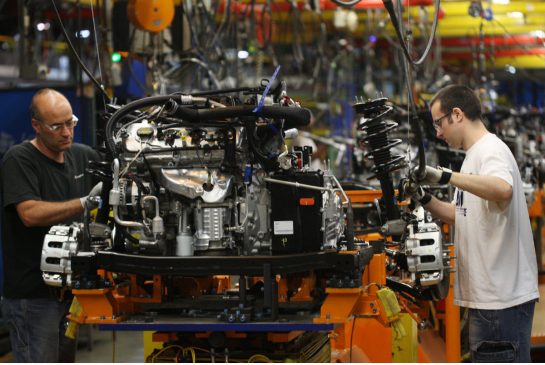Stephen Harper’s Canada-EU trade deal sideswiped by Europe’s US fears: Walkom

Toronto Star | 1 May 2015
Stephen Harper’s Canada-EU trade deal sideswiped by Europe’s US fears: Walkom
Canada’s prime minister is taking credit for jobs created by a free-trade deal that may never exist.
By: Thomas Walkom, National Affairs
Stephen Harper is already taking credit for jobs he says will be created by the Canada-European Union trade and investment pact. He may be premature.
“Put very simply, it’s because our government negotiated a free-trade deal,” the prime minister said in March after Honda announced plans to export an unspecified number of autos to Europe from its Alliston, Ont., plant.
“This is an example of what our government is doing.”
There were only two problems with this pre-election bit of braggadocio.
First, Honda says its planned exports to Europe will create only a “modest” number of jobs.
Second, and more important, the Canada-EU deal, formally known as the Comprehensive Economic and Trade Agreement (CETA), is by no means a done deal.
Growing opposition inside Europe to a similar free-trade pact being negotiated with the United States has already sideswiped CETA.
At the very least, this opposition promises to delay the EU’s final ratification of the Canada deal. It could derail it.
The problem is a section in both the Canadian and draft U.S. treaties giving non-judicial trade panels the authority to overrule laws — including those dealing with environmental protection — that interfere with the profitability of foreign corporations.
Canadians are already familiar with this system. A similar chapter in the 1993 North American Free Trade Agreement has been used successfully by U.S. companies to overrule Canadian federal and provincial laws.
Initially, most Europeans didn’t notice when this investor-state dispute system was written into CETA. In fact, it is probably fair to say that initially most Europeans didn’t notice the deal with Canada at all.
That changed in 2013 when Washington and Brussels began negotiating a U.S.-EU pact that included a CETA-style investor-state dispute chapter.
Suddenly, trans-Atlantic trade became a political issue.
Europeans may not care much about Canada. But they do care about the U.S., particularly when faced with the possibility that EU laws, on matters ranging from genetically-modified foods to animal welfare to cultural protection, could be overturned by American big business.
In Austria and France, legislators passed non-binding resolutions against investor-state clauses in the proposed U.S.-EU treaty, known formally as the Transatlantic Trade and Investment Partnership (TTIP).
The French government said it was opposed. So did Germany’s Social Democratic Party, the junior partner in Chancellor Angela Merkel’s governing coalition.
And to forestall the possibility of U.S. corporations using their Canadian subsidiaries to accomplish the same ends, these critics said they would oppose similar investor-state dispute mechanisms in CETA.
For Harper, all of this is a political embarrassment. He has twice pronounced CETA a success, first in 2013 when an agreement in principle was hammered out and again last fall when formal negotiations ended.
But CETA still has to be ratified by the EU’s European Parliament. Members of the socialist bloc, the second largest in that parliament, say they oppose the treaty as written.
Depending on the outcome of an unrelated court case, CETA may also have to be ratified by each of the EU’s 28-member nations.
Negotiators now are supposed to be merely cleaning up the language of the final CETA text, adding a comma here or a period there. But press reports say some on the European side want to make substantive changes as well. In effect, that would re-open the entire treaty.
Council of Canadians chair Maude Barlow, who opposes CETA, is buoyant. She says the whole deal could unravel.
“It’s not going to be adopted in this form,” she said. “It’s not.”
She may be overly optimistic. Powerful business interests within the EU support deals with Canada and the U.S. European politicians may be critical now. But politicians can change their minds.
In Germany, Social Democratic leader Sigmar Gabriel, who is Merkel’s economy minister, had been a fierce opponent of investor-state dispute mechanisms in both the Canadian and U.S. pacts. He has now reversed his position.
Still, the Canada-EU deal is not quite the solid triumph Harper had wanted. In fact, it does not yet exist.
It could stay in limbo until the EU and the U.S. sort out their arrangement. It may not happen at all.





